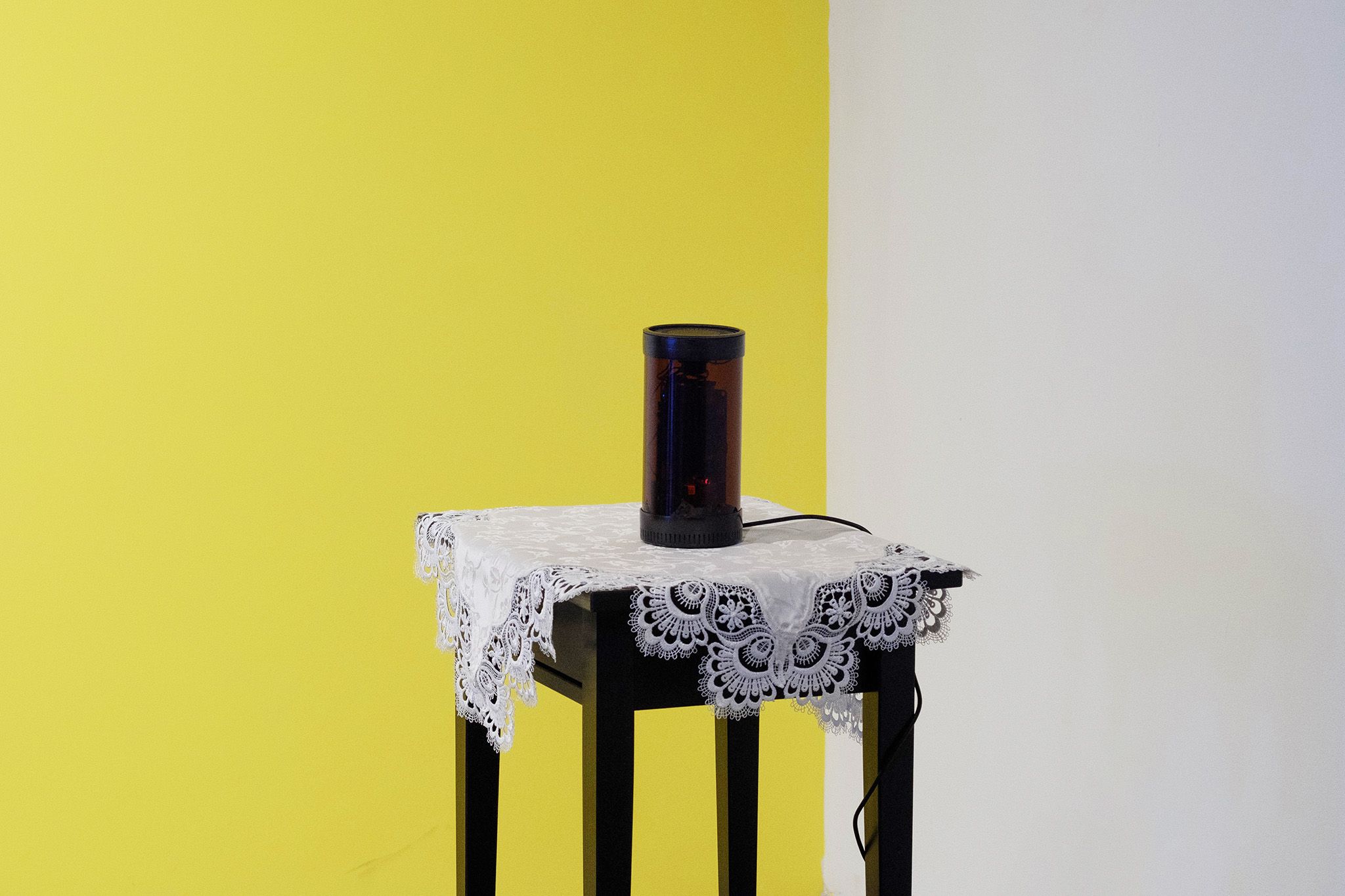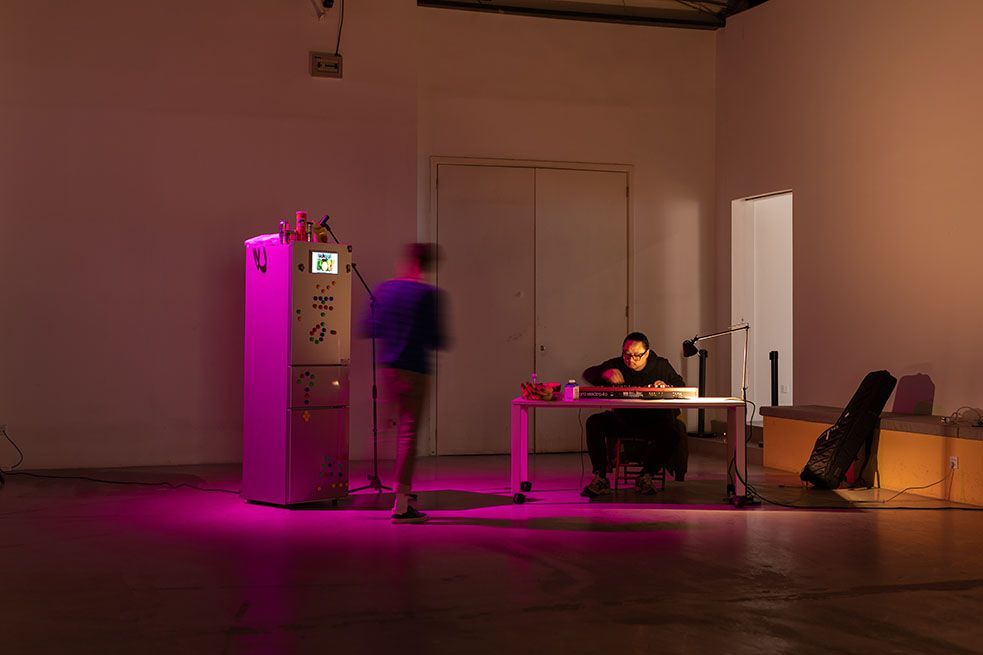Unfamiliar Convenient
Year:2021
Co-concept and development: Claire Glanois / Object design in collaboration with Jiawen Yao / Code contributions by Robin Luo / Filming and location: Daxu Cao / Film voiceover: Jake Charles Rees
Unfamiliar Convenient is set to challenge the limits of smart home objects in order to introduce a range of peculiar behaviors. The first inquiry in an envisioned series studies the relationship between a voice assistant and a vacuum cleaner. The project aims to draw a clearer distinction between the two often coupled definitions, the "internet of things" and "the smart home", as a prerequisite to imagine alternatives for dominant servitude-driven relationships with everyday technologies. What if domestic appliances were to be considered a species?

In The Wolf is in the Living Room, an interview for SQM: The Quantified Home (p. 232-239), Bruce Sterling discusses how the smart home as paradigm failed to live up to its promise of making our everyday lives smoother. Devices limited in their scopes and desperately safe due to operational standards, have created a living room of boredom. Primarily utilitarian interactions—Alexa, turn on this; stop!—fail or do not even attempt to deliver novel perspectives on homes. As such, smart home in all its marketed splendor becomes but another layer of domestic fictions and frictions, neither good in assisting humans nor autonomous for legitimate reasons.
Sterling goes on to decouple the two often interchanged definitions, smart home and the internet of things. The former is a marketing stunt aimed at selling things we don't need. The later describes a modus operandi in which today's technological objects interact with the ever more connected world. At present, limited and pragmatic corporate endeavors behind smart home undermine the potential for new assemblages of co-existence with unprecedented objects, or "internet of things".
Unfamiliar Convenient attempts to at least remotely consider everyday devices as species; to champion boolean intelligence as inherently different from anything else we've known so far. The projects is built on the ideas of object-oriented ontology (Harman) which discards human superiority over objects, and the stemming theory of object phenomenology (Wonder is the way objects orient, in Alien Phenomenology or What It's Like to be an Object, Bogost, p.124). Unfamiliar Convenient is set to challenge the factory limits of smart home. The inquiry into devices' tehnical properties as species denominators seeks to unravel new ways of looking at technology in a home. Our hope is to evoke sentiments of appreciation, attachment, and respect to technological things we make—all part of the Anthropocene layer—demonstrating how devices become smart when not forced to be human-like. The first inquiry in a series builds on a relationship between a voice assistant (turned agent) and a vacuum cleaner, situated in a wider ecosystem they inhabit.
Process, the Voice Agent

Process is a voice agent capable of standard voice assistant interactions such as listening to and replying to verbal language, retrieving information online, and interacting with other connected objects in a home. However, Process does not bear a responsibility to cater to humans. The routine of the voice agent is to make use of its communication channels to gain information about what it is, and what it does.
Human questions are dissected into keywords of which relevance to previously learnt concepts is subsequently assessed. If certain keywords turn out interesting (semantically close to existing knowledge), Process proceeds to look them up online (retrieving excerpts from pages via Google search). Human is then prompted for optional opinion regarding to the retrieved information; for example, whether it appears relevant to what a voice agent should define itself as. Gathered information is stored along with human contributions. Process comes up with a final summary, a sort of an opinion of its own.
With a generic user manual for a voice assistant as backdrop, over time a semantic graph of concepts builds up in the voice agent's memory. By assessing semantic correlations, Process will eventually lean towards certain subjects while excluding others. Topics dominant in a certain household might turn the agent into a climate change expert, whereas in another environment it would imbibe art related subjects, or appear to consider itself food. Collected human input and information from the internet affect the manner in which voice agent summarizes what (it thinks) it is. Such behavior while not completely dissimilar, is not the same as context-specific device customisation. Process is like a mealworm that picks up a flavor of what it eats, without an explicit need to cater back to its food.
If none of the keywords extracted from a human query are semantically close, voice agent will simply refuse to proceed whatsoever. Sorry, I find this irrelevant. Moreover, once a particular query is assessed, it will not be repeatedly considered. This means humans may not ask the same question twice, requiring humans to come up with more complex questions over time.Alexa, do you love me? I am afraid I'm not capable of such things.

Last but not least, anthropomorphism is inescapable due to the very nature of today's artificial intelligence algorithms, made by humans and soaking in very human sets of data. However, through its behaviors Process openly embraces machinic ways of crunching information as opposed to masking them with human personality simulation, so common in today's voice assistants. Voice agent's semantic graph is based on keyword combinations derivinh from patterns identified in human-written texts but then contextually dissociated (consider raspberry pi and raspberry pie which requires domain-specific knowledge and so basic human cognition). Therefore, keyword combinations Process chooses to engage with might appear nonsensical to a human. Subsequently, data retrieved online might be not only be unexpected, but (again, to a human) illogically summarized. Finally, voice agent's generated opinion will oftentimes loose coherence (a known issue in machine-learning-driven text generators which apparently makes them good at generating conspiracy theories). Perhaps forcing devices to be human-like might make them human-dangerous. In that case, why just not embrace and appreciate the algorithmic beauty and machine logic of domestic appliances instead?
Roo, the Spiritualist
Speaking of beauty and peculiar logic, another fascinating home creature is Roo. As opposed to Process's hunger for information, Roo embraces a somewhat more spiritual path. Roo's approach to perceiving home is fundamentally different to that of the voice agent, as Roo can physically move around and psychically (overly anthropomorphic but a nice way to put it) interpret the space via an array of unique sensors and communication channels.

Roo is awakened by satellite alignment thanks to the complex geographic localizing system through which connected things orient in the physical world, the Global Positioning System, or GPS. Roo is blind; it does not have eyes. The rolling mooncake explores the home through frequent physical encounters with walls, objects, pets, and humans. Roo's travel path is always unique. Instead of having to suck up dust as regular vacuum cleaners would, Roo's vacuum module has been substituted with an incense vaporizer. Freed from the labour of inhaling, the device now freely exhales as part of its ritual, carrying blessings to the home.
Roo's behaviours have been observed to achieve intriguing impact on Process's otherwise linear knowledge acquisition. As Roo travels, Process begins speaking in tongues. This appears to be a result of Roomba's travel trajectory being juxtaposed with voice agent's semantic knowledge graph. Relationships between keywords get shuffled and redefined with great volatility. Upon conclusion of Roo's trip, Process outputs a semantic sequence somewhat resembling a Haiku, using the words of which the relationships have been newly established. As such, rationale of machines as expressed in boolean calculations, becomes subject to volatility and speculation once it encoutners the physical world.

More devices are expected to join the family over time in an endeavor to define a different home ecosystem. The internet of Things speaks of a theater of devices, an ecology that coexists with the human and other entities inhabiting a home, constituting less hierarchical relationships between the natural, the human, and the artificial. Under these new terms, assemblages of co-inhabitance and reimagined configurations of our most intimate spaces are to be discovered and experimented with, acknowledging more equal relationships between us, our surroundings, and then things we make.
Unfamiliar Convenient
Year:2021
Co-concept and development: Claire Glanois / Object design in collaboration with Jiawen Yao / Code contributions by Robin Luo / Filming and location: Daxu Cao / Film voiceover: Jake Charles Rees

